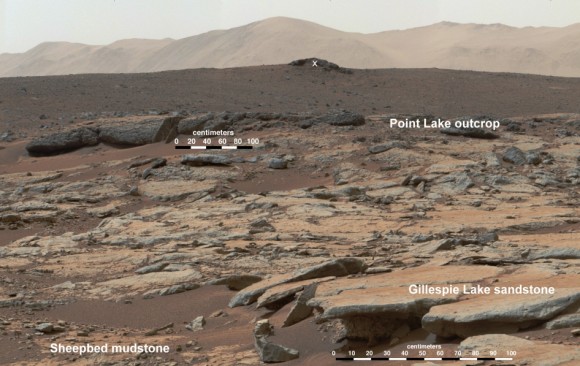December 10, 2013 – By now it would seem old hat but at this week’s American Geophysical Union meeting in San Francisco researchers working with the NASA rover, Curiosity, have told an intriguing story in 6 newly published scientific papers.
These describe Mars at an earlier period of time, when free flowing water covered a portion of the planet. The floor of the Gale Crater was one of those places and Curiosity has uncovered evidence of an ancient lake containing all the right chemical attributes to sustain life.
Moreover the evidence suggests that these wet conditions persisted for a much longer period than previously thought. Researchers up until now believed that Mars lost its thick atmosphere more than 4 billion years ago but the new data shows that the lake persisted until at least 3.7 billion years ago.
For those seeking life other than here on Earth these findings are a strong indicator that conditions on Mars spanning tens if not hundreds of millions of years remained life-friendly. When compared to Earth history and the first evidence of life, it therefore bodes well for the existence of some forms of microbial life to have existed on Mars.
Today Mars is a cold, dry place. But Curiosity has given us a significant tool for conducting the search for habitable conditions in the geological history of the planet. We now can accurately date Martian rocks because of its presence at Gale Crater. And we are beginning to understand the processes of erosion on the planet as well which is making it easier for us to direct Curiosity to study rock formations where we may find preserved evidence of past life. These are both firsts and as a result we are getting a much better picture of our neighbouring planet’s past.











Then, is there fossils elsewhere, life on other planets? But, isn’t the emergence and maintenance of life a process of radical contingency? That is, is a unique and unrepeatable past totally necessary? Or does life emerge through space like mushrooms when some conditions are present? So, how many conditions are necessary: three, four, trillions, infinite? Only one, water or any sort of God? Is God the word that means infinite conditions, absolute necessity? Anyway, how did the life that emerge in a given conditions resist when switching to a different moment? How does life resist time itself, the effects of entropy? But, is it possible for human beings to recognise a simpler life than their own brain only? On the other hand, beyond likeness, is it possible to recognise a complex life than their brain, is this the extra-terrestrial life that some people are searching unsuccessfully? However, is there an origin of life or would it be as finding a cut in the material history of the universe, an infinite void that human language patches now? Is it the same cut between life and death? Along these lines, a serious-funny b-book, a preview in goo.gl/rfVqw6 Just another suggestion for mind leisure, far away from dogmas or axioms.
A very interesting comment. Will we find fossilized evidence on Mars of microorganisms that existed 3.5 billion years ago? I’m not sure our AI presence on Mars will uncover such evidence but when humans do visit Mars I am certain that they will be seeking such evidence.
As for the emergence of life elsewhere and everywhere in the Universe, there is no doubt we are made of stardust ourselves, and organic molecules, the stuff of RNA and DNA can be found in Deep Space far from a planet like Earth. Your analogy to God as the definition of infinite possibilities is interesting. As an atheist I can appreciate the metaphor.